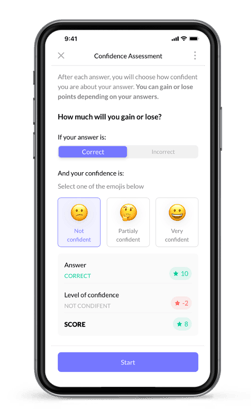Jul 16, 2021 2:39:24 PM
Training & learning | Employee experience
Jul 16, 2021 2:39:24 PM
Training & learning | Employee experience

If you think back to high school tests, you’ll remember how annoying it is when a friend scores higher than you after guessing the right answers, especially if you actually studied.
Performance stats alone don’t give us the full picture when assessing someone’s capability, it’s not only about arriving at the right answer, it’s about having confidence and understanding why it’s right.
When it comes to the workplace, the impact of confidence on decision-making is clear.
Overconfidence in the wrong decisions can have tragic results. Chernobyl Nuclear Disaster occurred when an employee approved a test which he and the operations team did not fully understand.
Even when employees guess correctly, making the right decisions without feeling confident that they are right is still a concern. You wouldn’t be very pleased to find out that a mechanic you’ve hired only fixed your car on a fluke, or that a dentist guessed which tools she needed to use on your teeth.
Traditional training and testing fails to distinguish between employees who know the answer and employees who got the right answer by chance. In contrast, confidence-based learning enables employers to see how much employees really understand.
Kenny Cox explains that confidence-based learning ‘acknowledges the spectrum of learner responses and provides a bridge from traditional assessment to a more complete picture of a learner’s understanding’.‘
Confidence-based learning achieves this by assessing learners using two metrics. Like typical training, it tests learners’ knowledge based on how accurately they answer questions or make choices. However learners are also required to rate their confidence in their choice.
Organizations are then able to cross-reference both scoring metrics to classify learners into the following categories:
"Frontline employees not only need to be able to make the right decisions, they need to be confident enough to be able to make them autonomously."
Frontline employees are the face of your product or service, they deliver your brand values in human form. They are constantly on their feet or on the road juggling multiple tasks at once in a fast-paced environment, often without anyone on hand to help.
In roles as active as these, deskless workers don’t have time to look up the right answers in a back office manual when they are unsure. They not only need to be able to make the right decisions, they need to be confident enough to be able to make them autonomously. A measurable outcome of good training is behaviour change, and to really shift behaviour and improve performance, employees need to be confident that the decisions they make are right.
If a product is urgently recalled from a store because it is unsafe, store employees need to be confident that they have correctly removed every unit of that product from the shelves.
If a restaurant customer asks a waiter about allergens in a new menu product, the waiter needs to be confident that they are giving the customer the right information. Otherwise, the outcome could be disastrous.
If a gym employee is asked how to use a piece of new equipment, they need to be confident that they can give accurate instructions on how to use it safely.
Frontline employees are there to serve, guide and advise. If they don’t sound confident or don’t have the right information, it directly impacts customer experience and customers will lose faith in the brand.
And from an organizational standpoint, confidence-based learning helps identify areas where employees are struggling, and then training can be improved. For example if you notice that learners are scoring well on quizzes on a particular topic, but their confidence levels are low, it’s clear you need to make improvements (e.g. changing the way the content is presented or making it more concise).
A confidence-based approach to learning asks learners to answer a quiz question and then indicate how confident they are that their answer is correct. Learners score maximum points for being fully confident in the correct answer and lose maximum points for being fully confident in the wrong answer.
 This type of learning encourages employees to reflect on their knowledge and identify gaps in their understanding, allowing them to focus their learning and move forward as a more autonomous learner.
This type of learning encourages employees to reflect on their knowledge and identify gaps in their understanding, allowing them to focus their learning and move forward as a more autonomous learner.
When businesses have a clearer view of employees’ understanding, they can tailor training to their needs to better equip them for decision-making at work.
So if an employee falls into the ‘doubter’ category, they can build their confidence with spaced repetition of training materials to cement their understanding and build confidence.
Alternatively, employees who fall into the ‘misinformed’ category may need to be assigned extra learning to grasp an understanding of the correct information and begin to re-build confidence.
With better visibility into how strong employee knowledge actually is, organizations can shape training around the needs of frontline workers and prevent mistakes or obstacles before they happen. Employees who feel better supported with training tailored to their needs will be more empowered and are more likely to perform their best.
--
YOOBIC not only gives frontline employees all the information they need at their fingertips, but also boosts their confidence in applying that knowledge. To find out how confidence-based learning can upgrade training within your organization, schedule a demo today!
Search the blog

See why 350+ businesses are using YOOBIC
YOOBIC creates a better everyday working experience for frontline teams while helping businesses drive performance at scale.
PRODUCT
See why 350+ businesses are using YOOBIC
YOOBIC creates a better everyday working experience for frontline teams while helping businesses drive performance at scale.